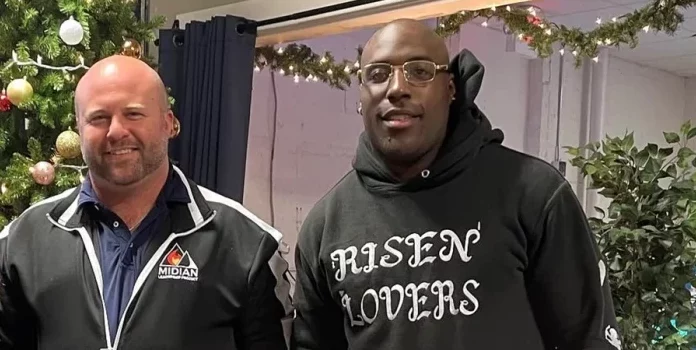(Kerry McDonald, FEE) When star football player Turan Rush returned home to Charleston, West Virginia, after graduating from Eastern Michigan University in 2021, he knew he wanted to make a positive impact on the young people in his community. Growing up on Charleston’s West Side, where he attended the city’s district schools, Rush became concerned about the school-to-prison pipeline. He witnessed friends get caught up in this pipeline, in which extreme disciplinary practices in schools cascade into a pathway toward mass incarceration.
Rush explained that school itself has “prison vibes.” The coercive, command-and-control environment that characterizes much of today’s standard schooling subjects young people to far more restrictions on their freedom than most adults would ever tolerate. Rush experienced this as a student, but it wasn’t until he saw his younger brother confronting harshness at school that he decided to build something better.
He was visiting a district middle school in Charleston as a special guest and entered a 7th grade classroom where he saw his brother and all of the other children sitting at their desks, facing the wall. Rush heard one student ask the teacher if he could use the bathroom. The teacher, who didn’t know that Rush’s brother was a student in his classroom, responded harshly to the student, stating: “That’s not your job. Your job is to sit, face the wall, and do your work.”
For Rush, the experience was jarring. “These are 10, 11, 12-year-old kids we’re talking about,” said Rush, who learned that his brother spent most of the day in this classroom. “You shouldn’t take a kid’s freedom away like that. It reminded me of a prison form, making someone face the wall all day. Just imagine what they’re doing to a 10-year old’s brain. Then you wonder why a kid is so rebellious to the school system.”
Rush knew there were other, more humane ways to deal with student discipline problems. Yet, he saw the same cruel disciplinary tactics being used now that he and his friends experienced when they attended these schools. “That really triggered me, seeing that nothing improved,” said Rush.
He joined Harvard-educated pastor Jeff Biddle in launching the Midian Leadership Project, an after-school, sports-focused community center for Charleston youth that incorporates basketball and weight training, along with mentoring, leadership development, and academic support. The program is open every weekday afternoon from 2:00 to 8:30, but that wasn’t enough for Rush. He wanted to create a full-time educational solution for West Side youth, not just supplemental services. So he and Biddle raised funds to purchase and renovate a dilapidated building on the same property as the community center, with plans to open an all-boys private school there in the fall of 2024.
“The school to prison pipeline is something that we are trying to beat, especially in our community,” said Rush. “The idea of building a private school is to put our men in our community in a safer space so they can grow.”
I was introduced to Rush and Biddle by Jamie Buckland of West Virginia Families United for Education, a non-profit that helps to encourage education entrepreneurs to create new learning options and connects parents to these options. When I visited the warm and welcoming community center and saw the amount of work it was going to take to renovate the other, old building on the property, I asked Biddle why he and Rush needed to wait 18 months to open the private school. Why not open now in their community center building?
“At this time, interpreting what might or might not be permissible from a building standpoint can be a pretty significant barrier,” said Biddle, referring to various local building codes. The community center, like similar after-school or enrichment programs, is able to welcome students from 2:00 to 8:30, but somehow not able to have students from 8:30 to 2:00 as a “school” program.
These outdated and often arbitrary building code regulations exist nationwide and can unnecessarily limit or delay the supply of new and varied education options for families. One organization is trying to minimize these barriers. “The Cardinal Institute is working to identify regulatory bottlenecks and unnecessary licensing hurdles and restrictions in West Virginia so education entrepreneurs can focus on their most important goal: educating children and serving families,” said Garrett Ballengee, executive director of the Cardinal Institute for West Virginia Policy.
Reducing these entrepreneurial barriers is particularly important now in West Virginia as the state rolls out its new, near-universal education savings account program, Hope Scholarship. The scholarship program provides more than 90% of West Virginia K-12 students with a portion of state-allocated education dollars, or about $4,300 per student each year, to use on approved educational expenses, including tuition at microschools and private schools, curriculum materials, supplies and related educational services.
Rush is a huge supporter of the Hope Scholarship Program, and of school choice policies more generally. “I think that was wonderful that they got that passed because giving a person the opportunity to choose what education they want, that’s freedom,” said Rush. “Some people can’t thrive in certain environments so some people need different education opportunities. What we’re offering is something that is going to impact our community. And we want to offer that because around here for a long time the resources have definitely been slim to none. We just want to provide opportunity because with opportunity the world is yours.”
The youth of Charleston may need to wait a bit longer than they should for that opportunity due to unnecessary regulatory constraints on education entrepreneurs, but when the Midian Leadership Project’s school opens next year it will be a major step forward in breaking the school-to-prison pipeline and providing a high-quality education to West Side boys.
“I’m hoping that they gain a solid education for one. That’s the most important thing,” said Rush of his future students. “And also a space to grow and be safe.”

